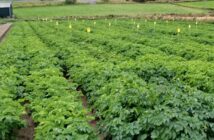Results were revealed from a second season of SPot Farm trials at WB Daw and Sons to around 50 potato experts from across the UK in Derbyshire las week.
In an open and honest discussion, Dr Phil Burgess, Head of Knowledge Exchange for AHDB Potatoes, said: “Through the Strategic Potato Farm West we’ve provided the potato industry with a platform to explore the potential of new research and technology alongside experts and researchers.”
Dr Burgess showed the accumulated results of work on seed rates for Taurus and Innovator varieties, which are new to the farm this year.
“There’s only so much we can show them at the SPot Farm itself and of course what works for the individual will be precise to their situation, their region, and their market requirements. But it’s within your capacity to experiment following our example and obtain accurate data bespoke to you that can really benefit your business.”
Dr Mark Stalham, research scientist of NIAB CUF and coordinator of some of the trials at SPot Farm West, started the session with the question of whether nitrogen fertiliser application should be reduced to compensate for the nitrogen availability coming from cover crops and manure.
The results from the trial at SPot West were somewhat frustrating, as is often the way in an individual case. Previous research had shown that excessive nitrogen leads to reduced yield.
In this case the highest overall yield was from the strip without manure, and the highest yield of long tubers was from manure added to a full fertiliser rate. But probably none of the differences would have been significant if this had been a replicated trial.
Chitting makes a comeback
Prompting keen discussion in the room, Matt Smallwood, agronomist for McCain GB, presented his findings following a return to chitting by host farmers Sam and James Daw.
The Pentland Dell crop, chitted at the farm, showed a substantial increase in yield of the longer size fraction required by the market. The Markies crop showed less yield improvement but a 7-10 day emergence advantage which proved valuable in mitigating the impact of planting delays in the spring due to inclement weather.
Andrew Wilson, a grower from Yorkshire at the event said: “I’d be interested to see the financial effect of chitting (in its various forms) to input costs, and the realistically achievable returns from it, since there’s no point spending a pound to only get a pound back.
There are clearly variations in the effectiveness of chitting between varieties, and this is backed by my own experience of chitting at home. It’s often difficult quantifying the benefit of gaining a week in crop maturity, but in some seasons this can make the difference between getting harvest finished before the weather breaks, and not.
Phil Burgess added, “We agree that the results can only spell out what’s worked for this site, this season. But it’s an example of the benefits up for grabs if you can take the inspiration, back it up with the economics and then apply it to your situation.”
Cutting the cost of cultivations
Work examining a range of pre-planting operations, specifically cultivating shallower and refining operations, produced valuable insights following two years of demonstrations on the topic.
Dr Stalham said: “We’ve demonstrated commercially once again that you can make savings and gain yield by paying close attention to your cultivations.
“Out of 72 trials we’ve done on reduced cultivation depth or intensity over the last 6 years, only two showed that shallower was worse.
“So we don’t need to produce more data; we know it works. It simply rests with you now to go out and test it for yourselves.”
The secret to SPot Farm Success
Sam Daw host farmer of SPot Farm West along with his father James, who were both instrumental in establishing the first ever site in 2015 concluded the event with thanks.
“The experience has been challenging, but ultimately rewarding. We’ve had the opportunity to try new methods, using our own standard technology and with the support of expert scientists. It’s clear we’ve had a second successful year and I would like to take this opportunity to thank everyone involved on behalf of myself and my father.”
Anne Stone, AHDB’s Knowledge Exchange coordinator for SPot Farm West said: “Having such enthusiastic host famers and collaborating scientists working hard to innovate and share their findings is essential to make a programme like this a success. We couldn’t achieve the results we do without that direct relationship between grower and researcher.”
Andy Goulding, Cheshire based Agronomist with Hutchinsons/CAS said: “This event has been really insightful. More growers should come along so they can challenge the research and themselves, but there’s certainly things I can take away from this and put in to practice for the benefit of my grower clients.”




